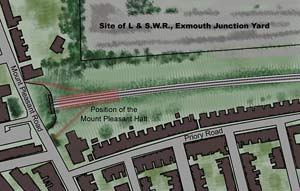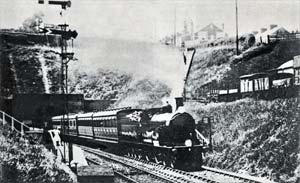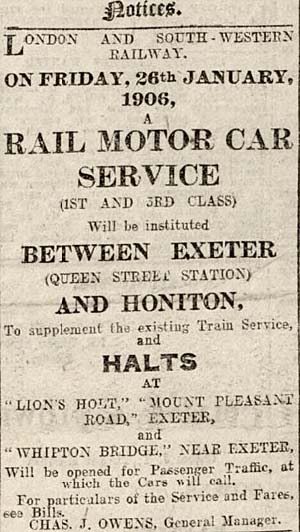
Mount Pleasant Halt
Page updated 26th July 2012
 This halt in what is known in Exeter as Mount Pleasant was, with Whipton Bridge Halt and Lion’s Halt, opened on Friday 26 January 1906, when the London and South Western Railways introduced a steam motor-rail service on the Queen Street Station to Honiton line.
This halt in what is known in Exeter as Mount Pleasant was, with Whipton Bridge Halt and Lion’s Halt, opened on Friday 26 January 1906, when the London and South Western Railways introduced a steam motor-rail service on the Queen Street Station to Honiton line.
The Western Times reported on the first trip carrying the Mayor, Tom Linscott and other dignitaries was reported:
Notwithstanding unfavourable weather, the trip was a very pleasant one. The car is admirably fitted with a view to the comfort of passengers, and the smoothness of running was generally commented upon. It is steam driven, one end being equipped with a steam motor, having outside cylinders of 10-inch diameter by 14-inch stroke and Meet diameter driving wheels. The boiler is of the locomotive type, the firebox being fitted with water tubes. The total heating surface of the boiler is 347 square feet; fire grate area, 6¾ square feet; boiler pressure, 175lbs. per square inch; capacity of water tank, 485 gallons; capacity of coal bunker, 1 ton. The total weight of the car in working order is 32 tons. 6cwt.; total length over body, 50 feet; centres of bogies, 34 feet 4 inches The car can be driven from either end, and is fitted with the automatic vacuum brake, and lighted with oil gas. There is seating accommodation for 8 first-class and 32 third-class passengers, making a total of 40. A luggage compartment is provided at the opposite end to the motor, and which accommodates either the driver or the guard, according to which direction the car is travelling.
The Company promised that they would provide an extra trailing coach if the traffic was particularly busy. The halt was right after the Blackboy tunnel, and 0 miles and 67 chains (0.84 miles) from Queen Street Station. The platform was a standard length of 122 ft. Traces of the footpath to the platform, on the northern side of the line, can still be traced in aerial photographs. The halt had two, small, wooden platforms and no shelter.
WIthin months special offers were made to encourage passengers, as reported in March by the Western Times:
EXETER RIFLES. Musketry.–Class Firing—Saturday, Part I, for recruits and trained men, 1.40 and 2.15 p.m. trains. Rifles will be issued on Friday. The CO. trusts that all members proceeding to the range on Saturday will go by the 140 p.m. train, which the General Manager, L and SW R, have kindly arranged for the benefit of Volunteers only, as unless sufficient members travel, the privilege will be discontinued. The following special trains have been placed at the disposal of Volunteers only depart, 1.40 p.m.; Lions' Holt, Mount Pleasant Halt, depart, 1.44 p.m.; arrive Honiton 2.19 P.m.
On Monday 1 June 1908, an additional steam motor-rail service was introduced to Topsham, calling at Mount Pleasant. The Western Times gave the details:
By Motor to Topsham The L. and S.W. Rail motor-car service between Queen-street, Exeter, and Topsham was starred under very favourable conditions, yesterday, and the number of passengers who have so far patronised the motors is considered by the Company as in every way satisfactory. The ordinary Exmouth traffic on Sunday was run over the new double line as far as Topsham in order to make sure that things were in thorough working order. The Company intend the primary purpose of the service to be the linking up of the four Halts. Lion's Holt. Mount Pleasant. Polsloe Bridge, and Clyst St. Mary, with Exmoutfh, the time-table being so arranged that passengers journeying by rail to Topsham have only a short time to wait there for the Exmouth trains.
In September 1922, lobbying by the Exeter Ratepayer Association resulted in the L & S.W.R, including Mount Pleasant Halt and Polsloe Bridge as stops in their late, 7:45 pm train from Exmouth. This was to allow day trippers a later train home.
The halt failed to attract enough passengers, and on the 2 January 1928, it was closed.
 The down platform of Mount Pleasant Halt is on the left in this photo from the 1920s.
The down platform of Mount Pleasant Halt is on the left in this photo from the 1920s.
 Advert from the Exeter And Plymouth Gazette from the 26 January 1906.
Advert from the Exeter And Plymouth Gazette from the 26 January 1906.
│ Top of Page │